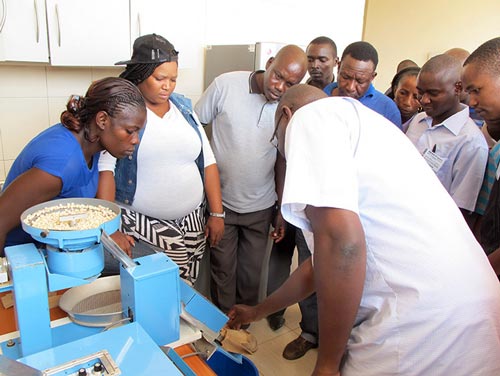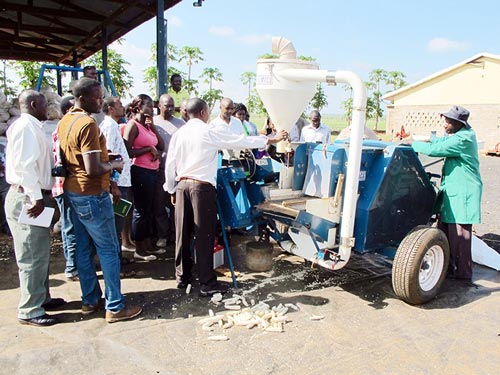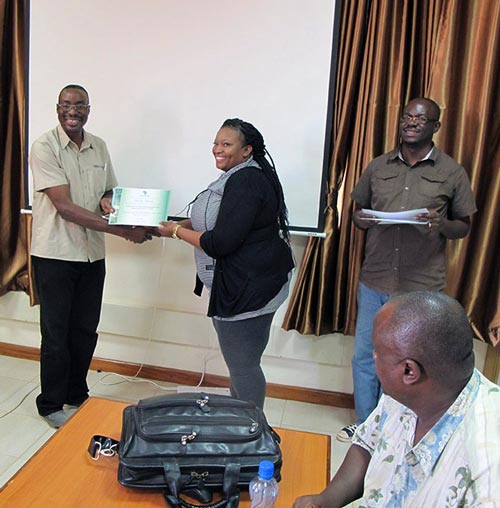By Wandera Ojanji/CIMMYT

Amini Mataka, a research officer for CIMMYT’s Southern Africa Regional Office in Zimbabwe, was one of many Water Efficient Maize for Africa (WEMA) scientists and technicians who experienced difficulty using data generation and processing equipment.
But after attending the “Towards Quality Data through Effective and Efficient Use of Equipment in WEMA” training course held in Nairobi, Kenya, on 15-22 March, this is no longer the case. “I can now confidently and competently use the Motorola Scanner, make it compatible with computers and use Fieldbook to analyze data and prepare nurseries and trials,” Mataka said.
According to Stephen Mugo, CIMMYT Global Maize Program principal scientist and CIMMYT-WEMA team leader, these difficulties encouraged WEMA to train 28 scientists and technicians from CIMMYT and national agricultural research systems from the five WEMA countries – Kenya, Mozambique, South Africa, Tanzania and Uganda. The training provided participants with skills in the preparation of nurseries and trial design and seed preparation using Fieldbook; the printing of seed packet and field labels in Fieldbook; the basics of data collection using equipment and data analysis using appropriate software; and the use and care of computers, printers, seed counters, threshers and data collection equipment.

Caroline Thatelo, senior research technician for the Agricultural Research Council-South Africa, learned how to use Fieldbook, a tool developed by CIMMYT maize breeders for managing experiments and data analysis using the open-source data analysis software “R.” “We had problems using Fieldbook when we started,” Thatelo said. “But the practical demonstrations we have gone through have now made me perfect in the use of Fieldbook. I can now create an inventory, a seed increase nursery, a nursery to form single crosses, a stock list, consolidate inventories, generate trials and analyze data for single- and multi-location sites using Fieldbook.”
To some, like Gabriel Ambani, senior technician at the Kenya Agricultural Research Institute (KARI)-Kakamega, Kenya, the training was an eye-opener. “Before this training, I had no hands-on experience on the use of most of the equipment we were trained on, particularly the Motorola Scanner, label printers and bulk sheller,” he said. “I now have increased competence and am looking forward to applying my gained knowledge and skills to effectively use the equipment.”

Sylvester Oikeh, WEMA project manager, called on the participants to put their new skills into use. “I want to see improvements in data collection and analysis. Do not be afraid to use the equipment and Fieldbook,” he said. “You are bound to make mistakes. But through the mistakes, you will figure out the right way to operate the equipment and use Fieldbook. You will get it right after several attempts.”
Several CIMMYT scientists and technicians helped organize and facilitate the workshop, including breeders Stephen Mugo and Yoseph Beyene; technicians Andrew Chavangi, John Gakunga and Collins Juma; and Joel Mbithi, CIMMYT-Kiboko farm manager. WEMA Phase II is funded by the Bill & Melinda Gates Foundation, the United States Agency for International Development-Feed the Future initiative and the Howard G. Buffett Foundation.
 Capacity development
Capacity development